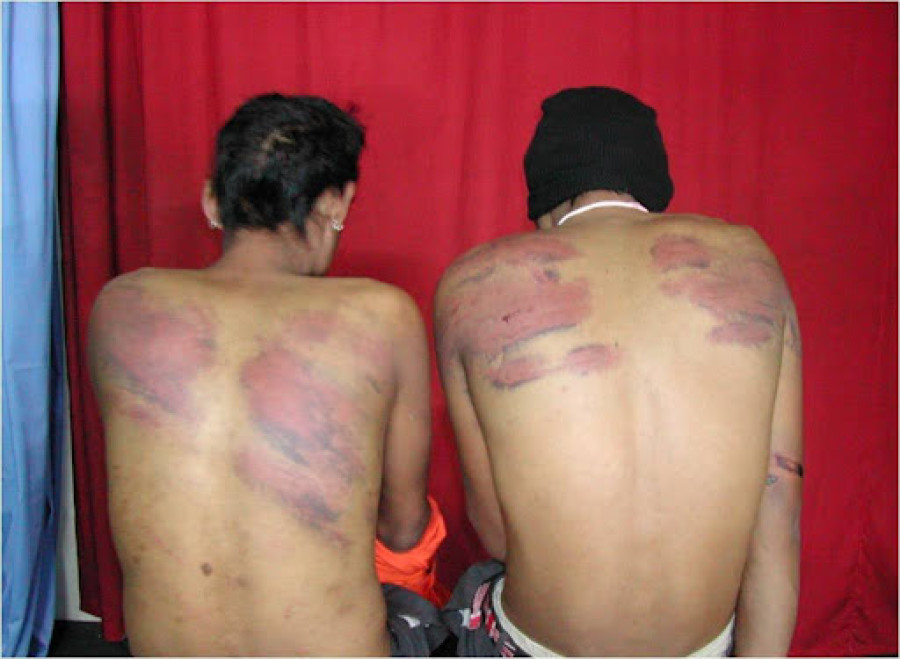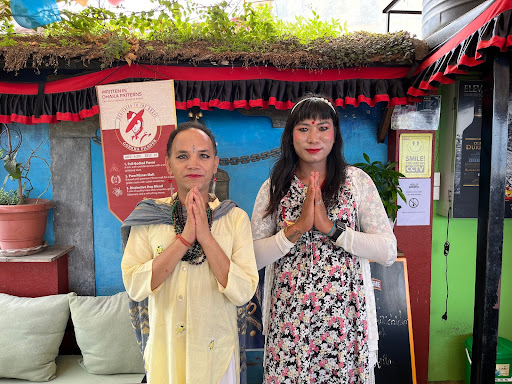National
Nepal’s transgender sex workers face violence and exploitation in legal vacuum
As they often find themselves in confrontation with police officers, clients, and fellow sex workers, LGBTIQ advocates call for legalisation of sex work.
Ellie Davis
Namaste Shrestha worked as a teacher for five years, giving math and science lessons in private schools for grades three through eight. But as a gay man who exhibited some feminine traits with gestures and enunciation, Shrestha, who now identifies as non-binary and uses she/her pronouns, felt alienated in her work environment.
“The teachers and principal in every school were my enemies,” she said. “I was tired of teaching because of that bullying.”
Without other job options, Shrestha turned to sex work. For the past two years, she has worked most nights in Koteshwar, standing on the side of the road in women’s clothing and makeup, along with a few friends who also do sex work. On a good night, Shrestha can make more than Rs2,000, but she often goes home with nothing. Though her dream is to work in a school where LGBTQ youth are welcome, Shrestha, along with other transgender women who do sex work, feels trapped.
Shrestha is one of many transgender women who, without other work opportunities, has turned to sex work. Alienated from society, Shrestha and other transgender sex workers find themselves stuck in a lawless world filled with conflict, exploitation, and violence—from police officers, clients, and fellow sex workers.
“It’s a very complex scene of trans sex work here,” said Sunil Babu Pant, a LGBTQ rights leader and executive director of Mayako Pahichan Nepal.
Nepali law doesn’t officially recognise sex work. The most recent regulation doesn’t criminalise being a sex worker itself, but it does criminalise soliciting sex work and paying for sex. Although existing as a sex worker is technically not illegal, in practice, sex workers face strict surveillance from police, according to Pant.
Most often, instead of targeting the clients for paying for sex, police target sex workers. “It’s never the clients that get arrested, only the sex workers,” Pant said. Transgender sex workers face the most harassment, compared to cis-gender sex workers, because they stand out, Pant said.
Gyanu Lama, who identifies as ‘third gender’, has been making a living through sex work for 23 years, and she’s endured multiple beatings from police. In 2003, she was arrested near Ratna Park. Police threw her and her friend in a van, told them to blindfold themselves with their shawls, and beat them until they were unconscious. The police presumed Lama and her friend were dead, and threw the bodies on the side of the road, Lama told the Post.
Today, when in public, Lama and other third gender or transgender women frequently face harassment from strangers and police. When Shrestha is standing in public with her friends, they fear running into police. “When police see us, they beat us with sticks,” Shrestha said.
Recently, police arrested Shrestha while she was standing on a public road, and detained her for four hours, she said. While she was in custody, police officers insulted Shrestha’s facial hair and asked for the phone numbers of her friends who were also sex workers so they could later request sexual favours from them, she added. The police eventually let Shrestha go, without providing a reason for her arrest.
Instead of arresting sex workers, sometimes police officers act as clients. When a police officer recently caught Shrestha with a client in a public park at night, instead of arresting Shrestha or the client, the police officer asked Shrestha for sex. Shrestha escaped by lying to the officer; she ran away saying that she needed to get a condom from her friend.
Even transgender people who don’t do sex work are targeted when they’re in public. “Police can use public offence law against anybody, but more frequently they use it against transgender people,” Pant said.
Mouni Maharjan, who ran a campaign to become chairperson of ward 4 of Kirtipur Municipality last December as one of the two first-ever transgender women to run for local public office, often faces harassment and molestation from strangers who wrongfully assume Maharjan is sex worker.
The violence that transgender people face is often fatal. Honey Maharjan—who ran a campaign alongside Mouni in an attempt to become Kirtipur’s mayor—is now 42 years old and has been a lifelong LGBTQI activist. She’s currently working with Kirtipur-based advocacy organisation Samarpan Savya Samaj Nepal, or Dedication Civilised Society Nepal. Throughout her life, she’s seen her friends get injured and killed as a result of violence from police and clients.
Fifteen years ago, one of Honey’s friends, Sanjila, who the Post is identifying with a pseudonym, was arrested while walking home at night. The five police officers violently raped her in a public park. The next day, Honey took her friend to the hospital. “After the check up, the doctor was also crying because he saw what happened,” Honey said, referring to the wounds on her pelvic region. Her friend survived the rape and received Rs150,000 as compensation from police, but died from HIV roughly six years ago, Honey said.

The Nepal police did not respond to the Post’s request for comment regarding this incident.
Another one of Honey’s friends, Azita Bhudel, was gang raped and murdered two years ago at age 36. Bhudel had agreed to meet with a singular client, but was met by a room of six men who raped and killed her.
At this point, it’s hard for Honey to remember how many friends she has lost to either disease, violence, or suicide. “In Nepal there are many cases of suicide and people killing transgender people,” she said.
Because sex workers don’t see police as a source of safety, they have no one to turn to as a protector or mediator in instances of conflict. Often, disagreement between sex workers who are competing to get business from the same clients results in violence. If Shrestha and her friends try to solicit sex in a neighborhood where other sex workers are trying to gain clients, they are met with hostility.
“With dogs, they have one area, and if another dog comes they will fight and beat that dog,” Shrestha said. “It’s the same condition with sex work and trans people.”
In this environment, Shrestha often finds herself alone, without anyone to look out for her. When Shrestha and her friends recently got into a violent conflict with another group of sex workers, no one was there to help her.
“The others beat me very severely and my other friends, no one supported me,” Shrestha said.
Amid this conflict, within certain communities of sex workers, a power hierarchy forms, in which a group leader dictates where and how the others should engage in sex work. Dinesh Chaudhary works as the Drop in Center Operator at NGO Shanti Nepal, and through his job providing health and legal support to sex workers, he has observed these complicated power dynamics. “There are different hierarchical groups,” he said. “One leader coordinates all the sex workers, and gives orders to them.”
Shrestha has had to navigate this power structure in order to survive. “In our area, there is one king or queen,” Shrestha said. “They make rules about prices for sex and manage if anyone fights.”
LGBTQ activists agree that legalisation of sex work in Nepal could help transgender sex workers do their work more safely, but few see legalisation as possible in today’s political environment.
“The solution is to amend the law and make sex work legal,” Pant said. If sex work was legalised, he said, sex workers could earn income more safely by working out of their homes or rented rooms, rather than on the street.
As Pant noted, sex work has a long history in Nepal, and shows no sign of ending. In his view, the country has a choice between letting sex work continue continue illegally or legalising and regulating the industry.
“We will always have sex work—there will always be people who will choose to come into this profession,” he said.
Honey agrees that legalisation could make sex work safer, but she doesn’t think this change will happen anytime soon. “If they legalise sex work, it will help the community practice safer sex, but the government is still not talking about this,” she said.
Even if sex work was legalised, LGBTQI advocates emphasise that transgender and third-gender people still need more access to other work opportunities. Changes like workplace protection policies and non-discrimination policies in hiring could help LGBTQI community members find employment, Pant said.
On top of government policy, for transgender people to find employment outside of sex work, society’s view needs to change, advocates say.
“There needs to be a shift in perspective to see third gender people as productive—the whole attitude is that they aren’t serious and they can’t do jobs,” Pant said.
Nisha Kuikel, a psychological counselor who works with members of the LGBTQI community at Shanti Nepal, doesn’t think gender identity impacts an employees’ capability. “We think trans women can only do sex work, that’s not a healthy thought,” she said. “Why does sexual identity affect work? A person’s hands, eyes, and mind matters, not whether they are LGBTQI or not.”




 22.11°C Kathmandu
22.11°C Kathmandu














